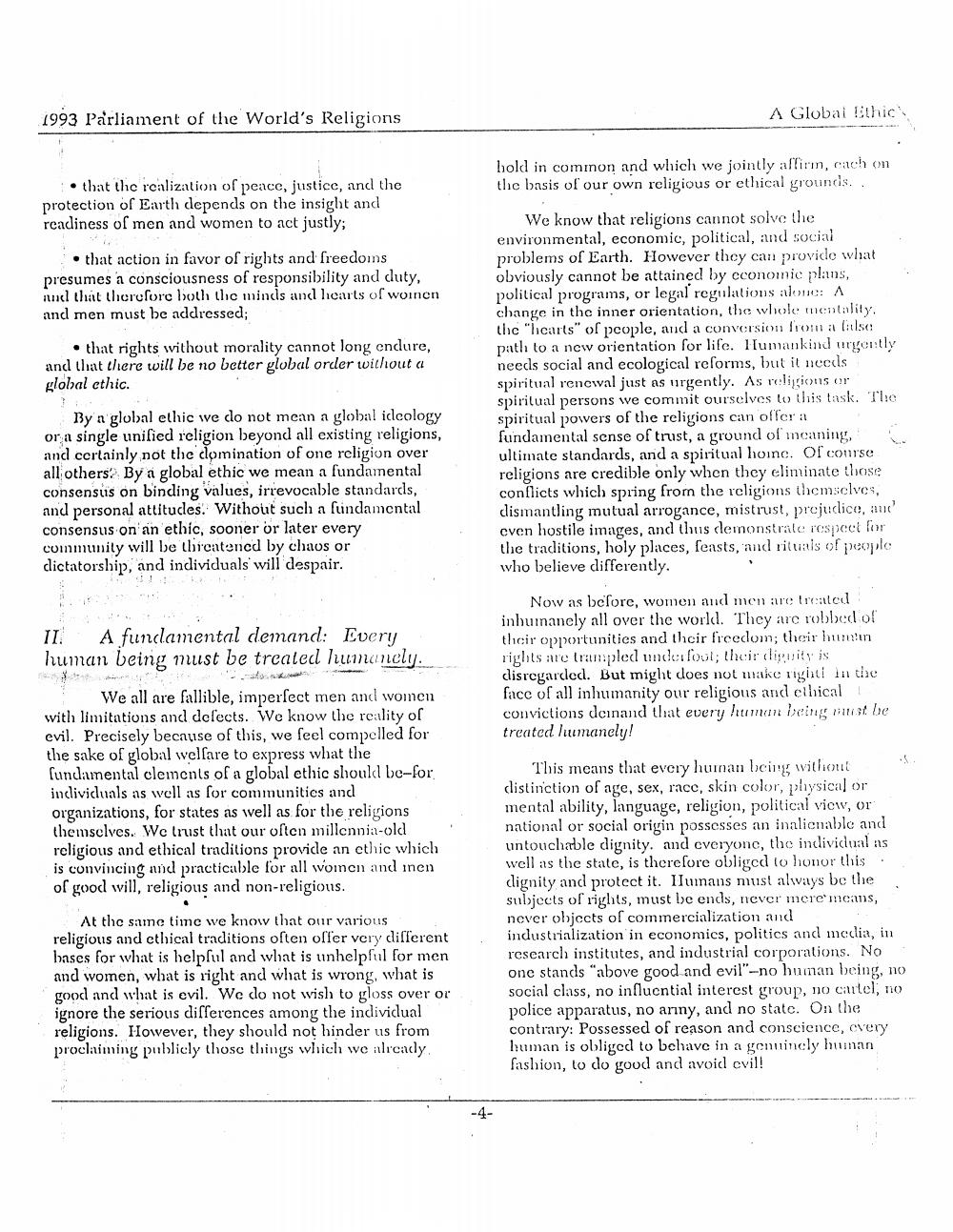Book Title: Principles Of A Global Ethic Author(s): Publisher: View full book textPage 2
________________ 1993 Parliament of the World's Religions A Global Ethic hold in common and which we jointly affirm, cach on the basis of our own religious or ethical grounds. . * that the realization of peace, justice, and the protection of Earth depends on the insight and readiness of men and women to act justly; that action in favor of rights and freedoms presumes a consciousness of responsibility and duty, annel that therefore both the minds and learts of woinen and men must be addressed; * that rights without morality cannot long endure, and that there will be no better global order without a global ethic. We know that religions cannot solve the environmental, economic, political, and social problems of Earth. However they can provicle what obviously cannot be attained by cconomic plans, political programs, or legal regulalions alone: A change in the inner orientation, the wbole mentality, the "hearts" of people, and a conversion from a false path to a new orientation for lise. Humankind urgently needs social and ecological reforms, but it neels spiritual renewal just as urgently. As religions or spiritual persons we commit ourselves to this task. The spiritual powers of the religions can offer a fundamental sense of trust, a ground of meaning, ultimate standards, and a spiritual hoinc. Of course religions are credible only when they eliminate those conflicts which spring from the religions themselves, dismantling mutual arrogance, mistrust, prejuclice, au cven hostile images, and thus demonstrale respect for the traditions, holy places, feasts, and rituals of people who believe differently. By'n global ethic we clo not mean a global icleology or a single unified religion beyond all existing religions, and certainly not the clomination of one religion over all others? By a global ethic we mean a fundamental consensus on binding values, irrevocable standards, and personal attitudes. Without such a fundamental consensus on an ethic, sooner or later every community will be llicatencd by chaos or dictatorship, and individuals will despair. II. A fundamental demand: Every: human being muust be treated luumunely. Now as before, women and men are treated inhumanely all over the world. They are robbed of their opportunities and thcir freedom; their human rights are trampled underfool; their diperty is disregardled. But might does not make rigid in the face of all inhumanity our religious and cihical convictions deinand that every luman lycin 31nst be treated lumanely! We all are fallible, imperfect men and women with limitations and defects. We know the reality of evil. Precisely because of this, we feel compelled for the sake of global welfare to express what the fundamental clements of a global ethic should be-for inclividuals as well as for communities and organizations, for states as well as for the religions themselves. We trust that our often millennia-old religious and ethical traditions provide an ethic which is convincing and practicable for all women and inen of good will, religious and non-religious. At the same time we know that our various religious and ethical traditions often offer very clifferent bases for what is helpsul and what is unhelpful for men and women, what is right and what is wrong, what is good and what is evil. We do not wish to gloss over or ignore the serious disferences among the individual religions. However, they should not hinder us from proclaiming publicly those things which we already This means that every human being without distinction of age, sex, race, skin color, pliysical or mental ability, language, religion, political view, or national or social origin possesses an inalienable and untouchable dignity, and everyone, the incliviclual as well as the state, is therefore obliged to honor this : clignity and protect it. Huinans must always be the subjects of rights, must be ends, never mere'means, never objects of commercialization and industrialization in economics, politics and media, in research institutes, and industrial corporations. No. one stands "above good and evil"-no human being, 110 social class, no influential interest group, no cartel, no police apparatus, no arny, and no state. On the contrary: Possessed of reason and conscience, every human is obliged to behave in a genuinely human fashion, to do good and avoid evil! 1 - -4Page Navigation
1 2 3 4 5 6 7 8
